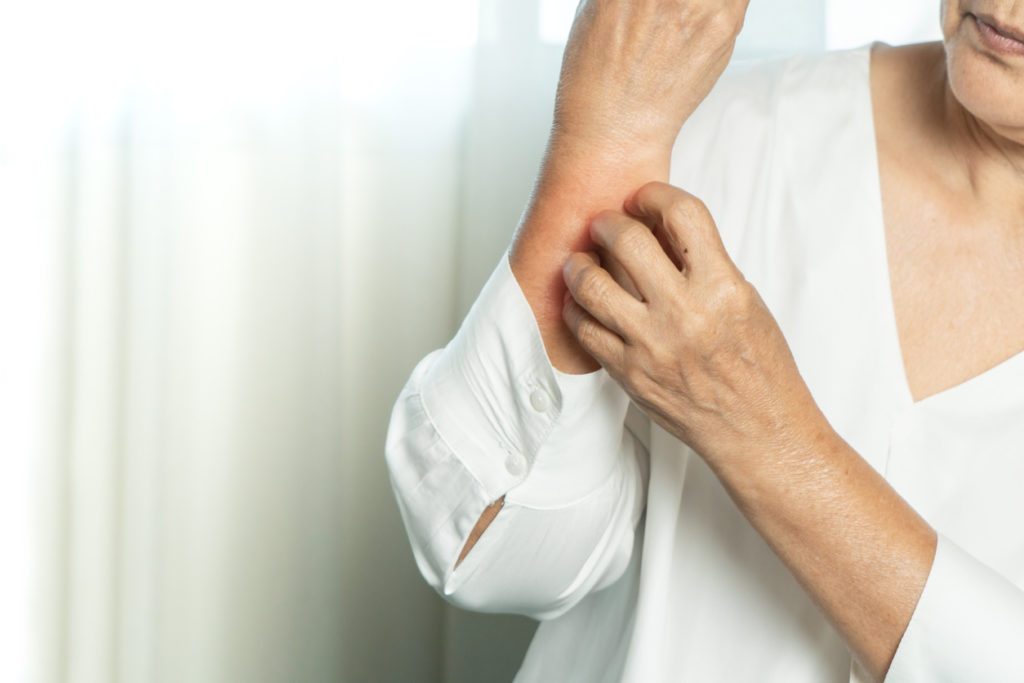
Ask a Doc: Hives

Raised, red, itchy, and painful welts or bumps. Hives. They happen when a chemical called histamine is released in your body. Anyone who has had them knows how annoying hives can be. In this instalment of “Ask a Doc,” Bret Kueber, M.D. answers questions about what makes hives so itchy – and mysterious.
What are hives?
Hives, known in the medical field as urticaria, are very common (but very annoying), usually self-diagnosable and often self-treatable. Symptoms include itchy, raised, red, or skin-colored welts on the skin’s surface. Most cases of hives go away within hours or a day or two. However, some people suffer from chronic hives where the welts appear for more than six weeks and recur frequently over months or years.
What causes hives?
The answer to this question isn’t simple and unfortunately, not all hives triggers can be identified. Many things can cause hives. Pollen, medications, food, animal dander and insect bites top the list. But hives might also be the result of stress, tight-fitting clothes, overheating from strenuous exercising, illnesses, infections, or alcohol. Although I haven’t come across this in my practice, it’s even possible for water to cause hives. Now, the water allergy is among the rarest of the rare with only a handful of known cases documented worldwide.
Why do I break out in hives on certain parts of my body sporadically with no rhyme or reason as to cause or irregularity?
Hives can affect any part of the body, but are most common on the torso, throat, arms, and legs. Any area of tight-fitting clothing, belts, elastic, etc. creates heat that can cause them to appear. The welts generally appear in clusters, with one cluster getting worse as another gets better. Welts vary in size and appear and fade repeatedly and on different parts of your body as your body’s reaction runs its course.
What can I do at home to get rid of hives?
Wear loose-fitting, cotton clothes. Apply a cold compress to the itchy skin several times a day (unless you notice that the cold actually triggers your hives). Hot water or a hot shower, while it feels good, causes the release of more histamine, spreading the hives. So, stay out of the hot tub and no hot showers. Instead, take frequent cool baths with an oatmeal product.
Although it may be hard – don’t scratch! Scratching hives can make them more inflamed and cause them to spread. Use anti-itch medication that you can buy over the counter, such as an antihistamine or calamine lotion. You can apply topical aloe vera, which is a natural anti-inflammatory, to your hives as needed; however, do a skin patch test first to be sure you don’t experience any irritation.
Claritin or Zyrtec (10 mg two times a day for adults) and Pepcid 20 mg twice a day have been helpful in relieving hives. Pepcid? Yes, the stomach medicine. It blocks the H-1 histamine receptor, so it can be very helpful in cases of hives that won’t go away.
When should I see a doctor?
You should see a doctor if your hives outbreak doesn’t disappear in a few days, if you get hives repeatedly, or if you notice your breathing becoming heavier or labored after a hives breakout. Be sure to get emergency care if you feel your tongue, lips, mouth, or throat swelling or if you’re having trouble breathing. A doctor can diagnose hives by looking at your skin, asking questions, and doing a physical exam. Other testing may be done if your doctor thinks a specific cause is likely (like a food allergy). If you’re experiencing severe or chronic hives, your doctor may prescribe oral corticosteroids.
Do you have a question for us? If so, please send your questions to the Clinic.
More Recent Healthcare News

Every year we celebrate Doctor’s Day and Nurses Week, but there’s one more recognition event that’s just as important. Administrative Professionals Day is April 24th this year and I want to be sure to bring special attention to three incredibly special members of the Boca Grande Health Clinic family. Jonna Foos, Director of Operations Jonna […]

April, the birth month of James Parkinson, is Parkinson’s Disease Awareness Month. Parkinson’s is a degenerative syndrome that results in the gradual loss of brain circuitry involved in movement, thinking and behavior. According to the National Institutes of Health (NIH), the first clear medical description of Parkinson’s Disease as a neurological condition was written in […]

March 30th marks a special day on our calendar – Doctor’s Day! It’s a time to honor those who dedicate their lives to caring for us. At the Boca Grande Health Clinic, it’s the extraordinary team of board-certified physicians – Dr. Raymond A. James, our Medical Director; Dr. Bret Kueber, the Assistant Medical Director; and […]

Ask a Doc: Kicking Colon Cancer in the Butt
March 22, 2024According to the American Cancer Society, the lifetime risk of developing colorectal cancer is about 1 in 23 for men and 1 in 25 for women. The death rate from colorectal cancer has been dropping in older adults for several decades. Unfortunately, colorectal cancers now rank as the leading cause of cancer death in men […]

